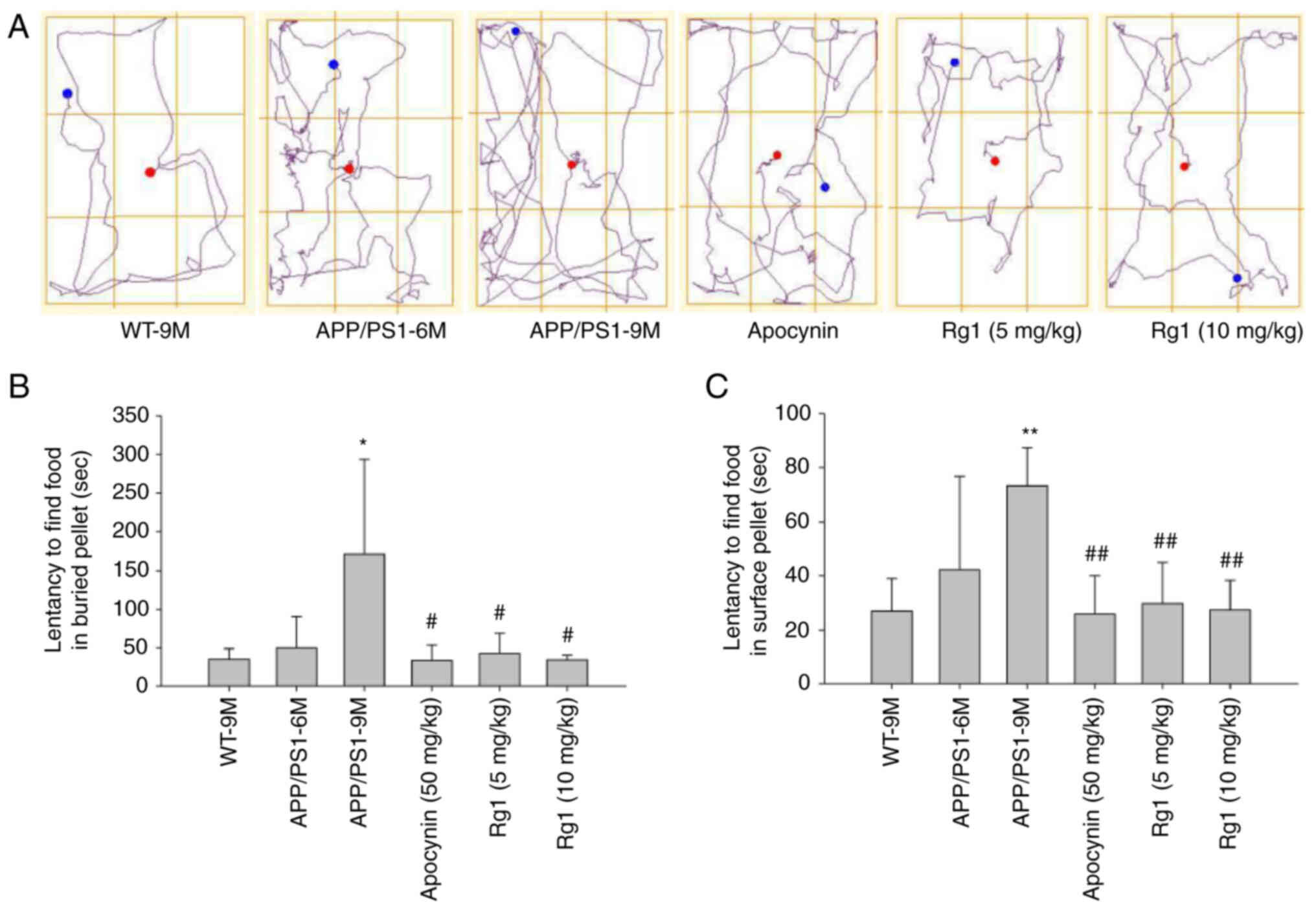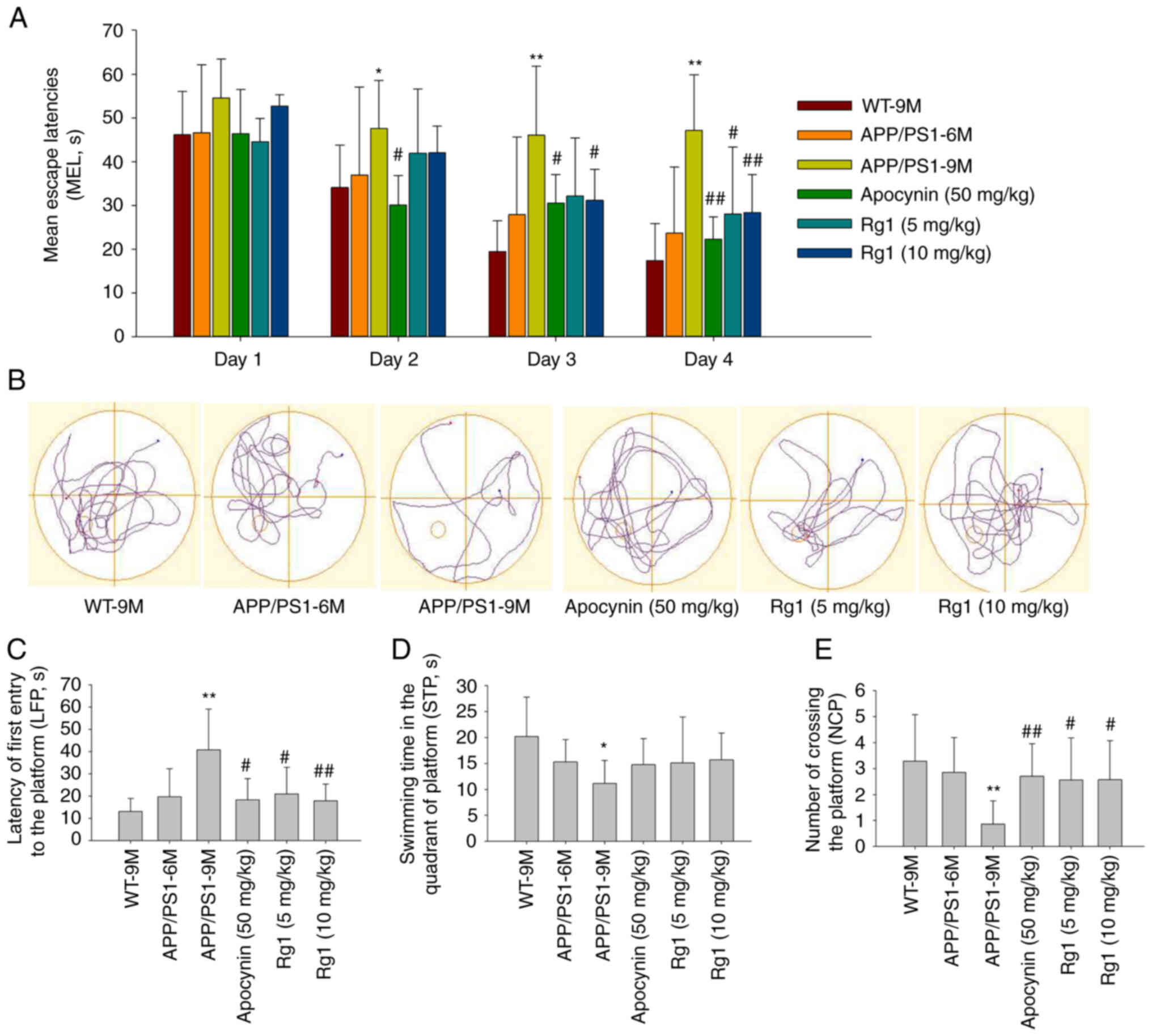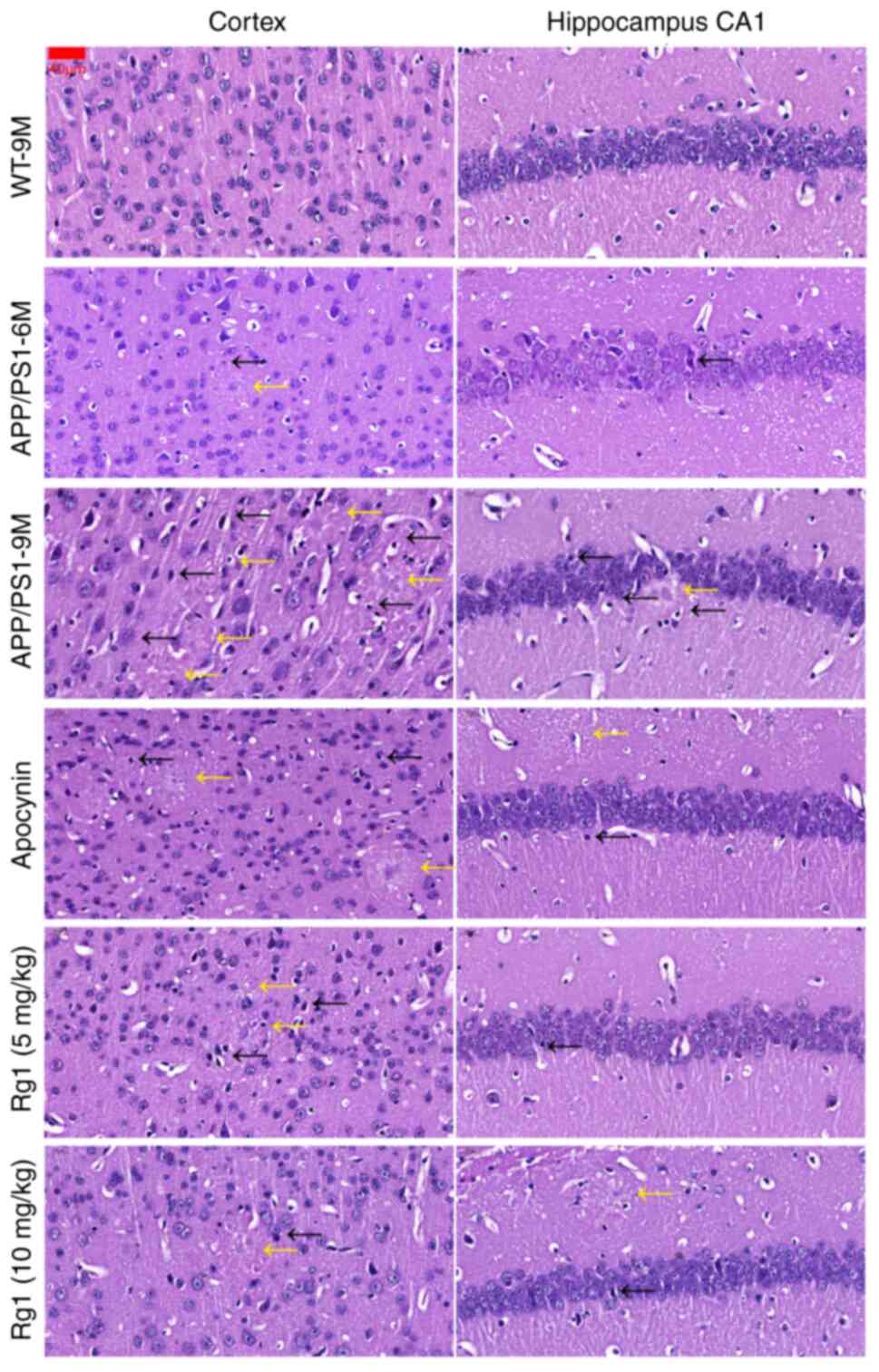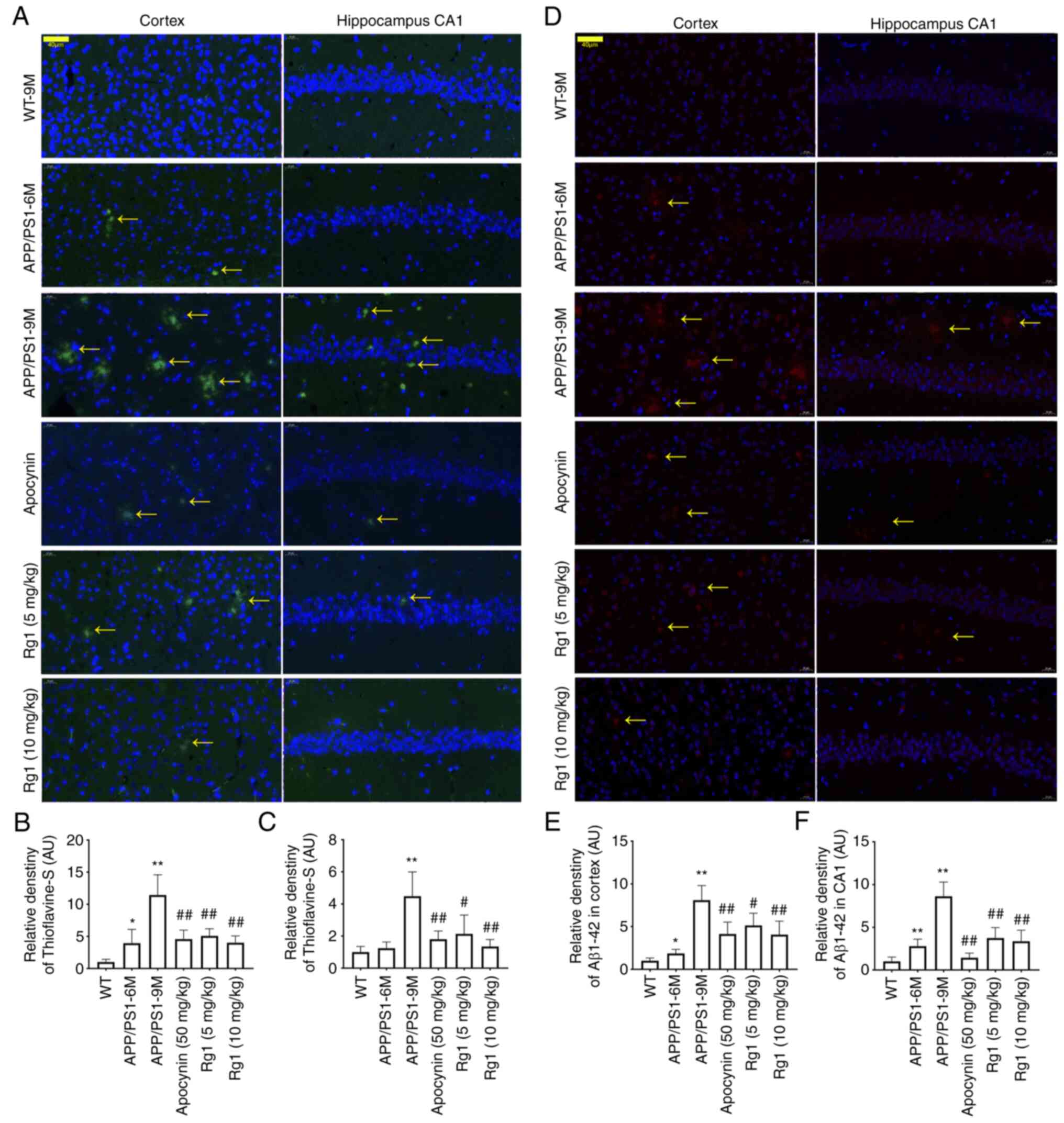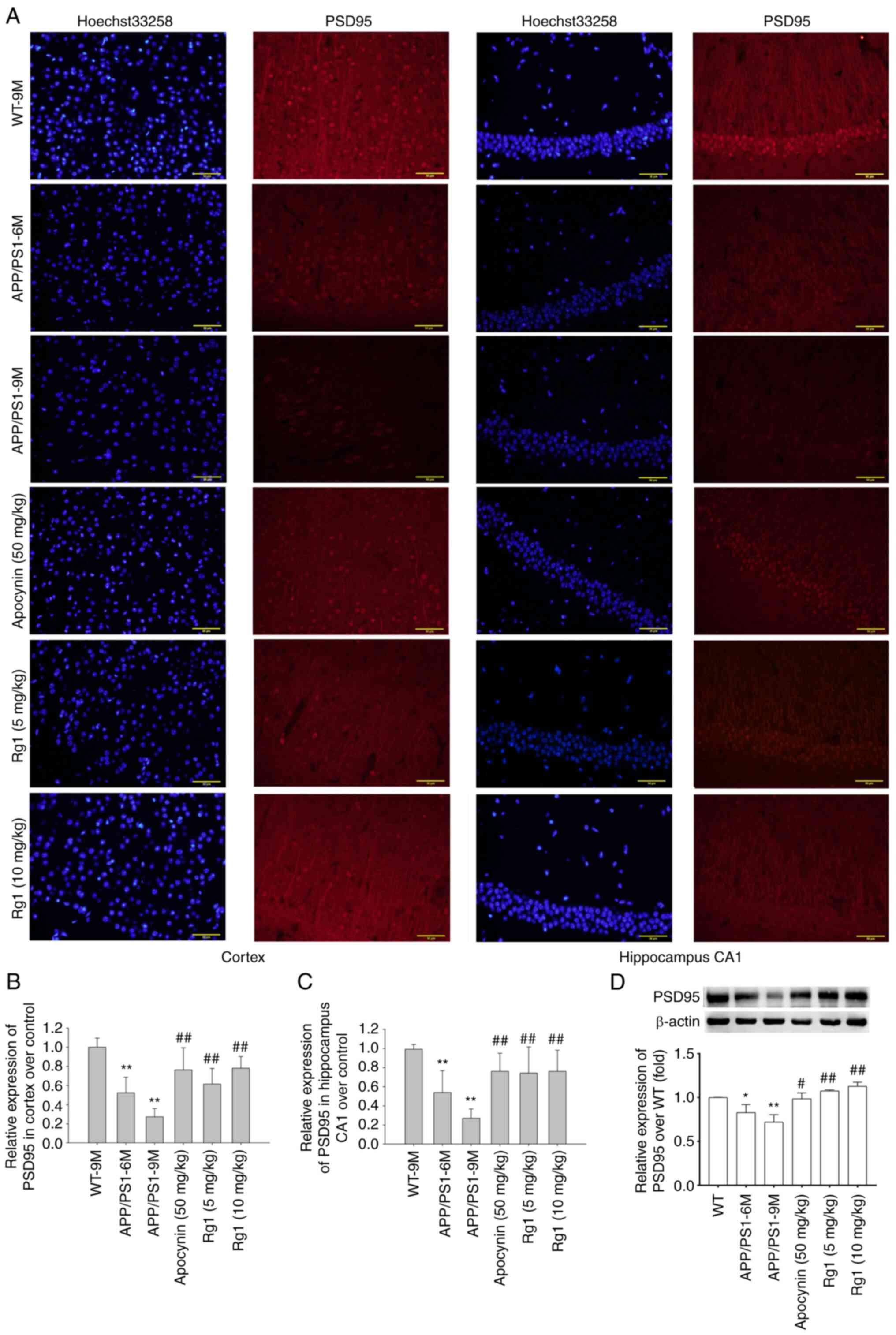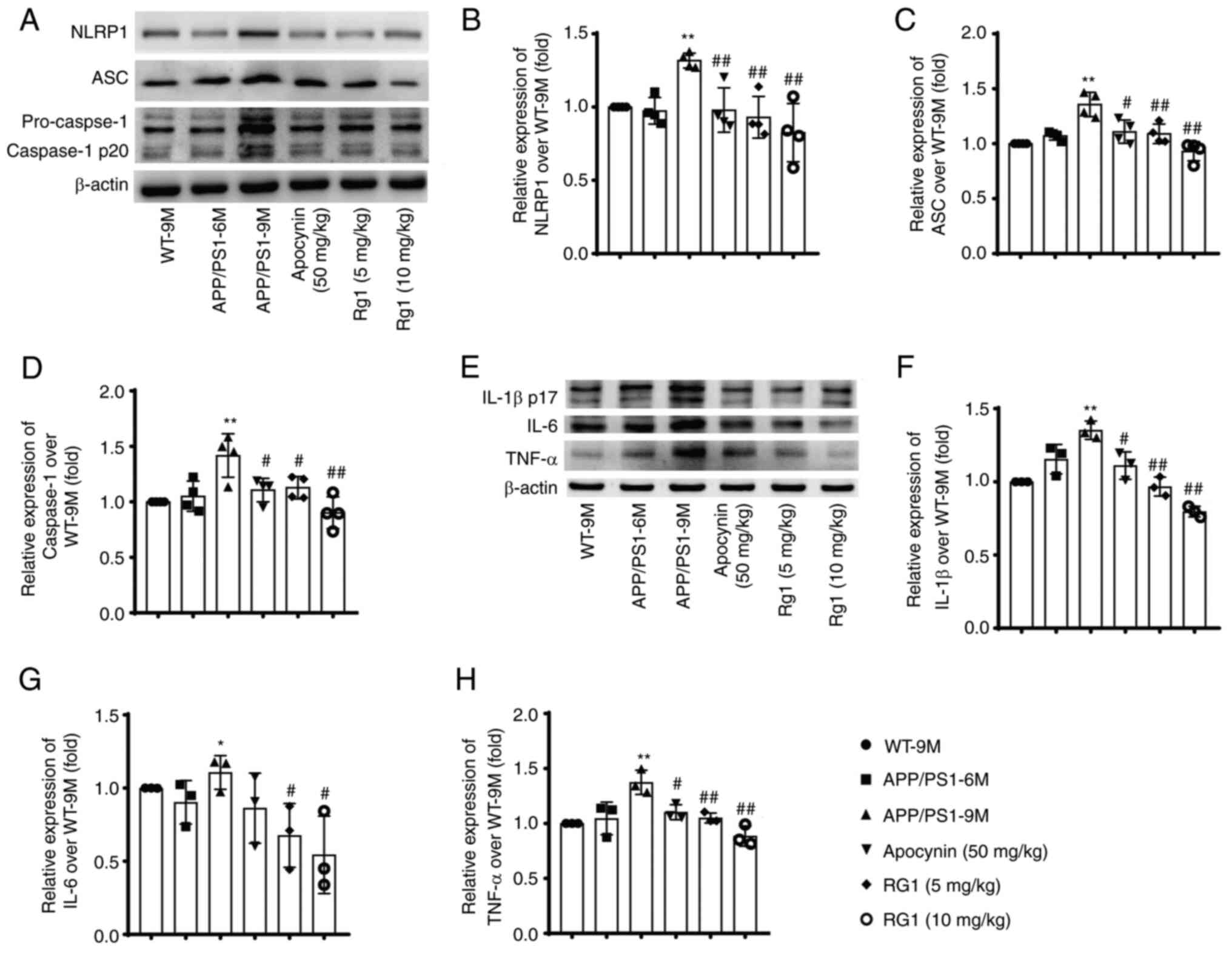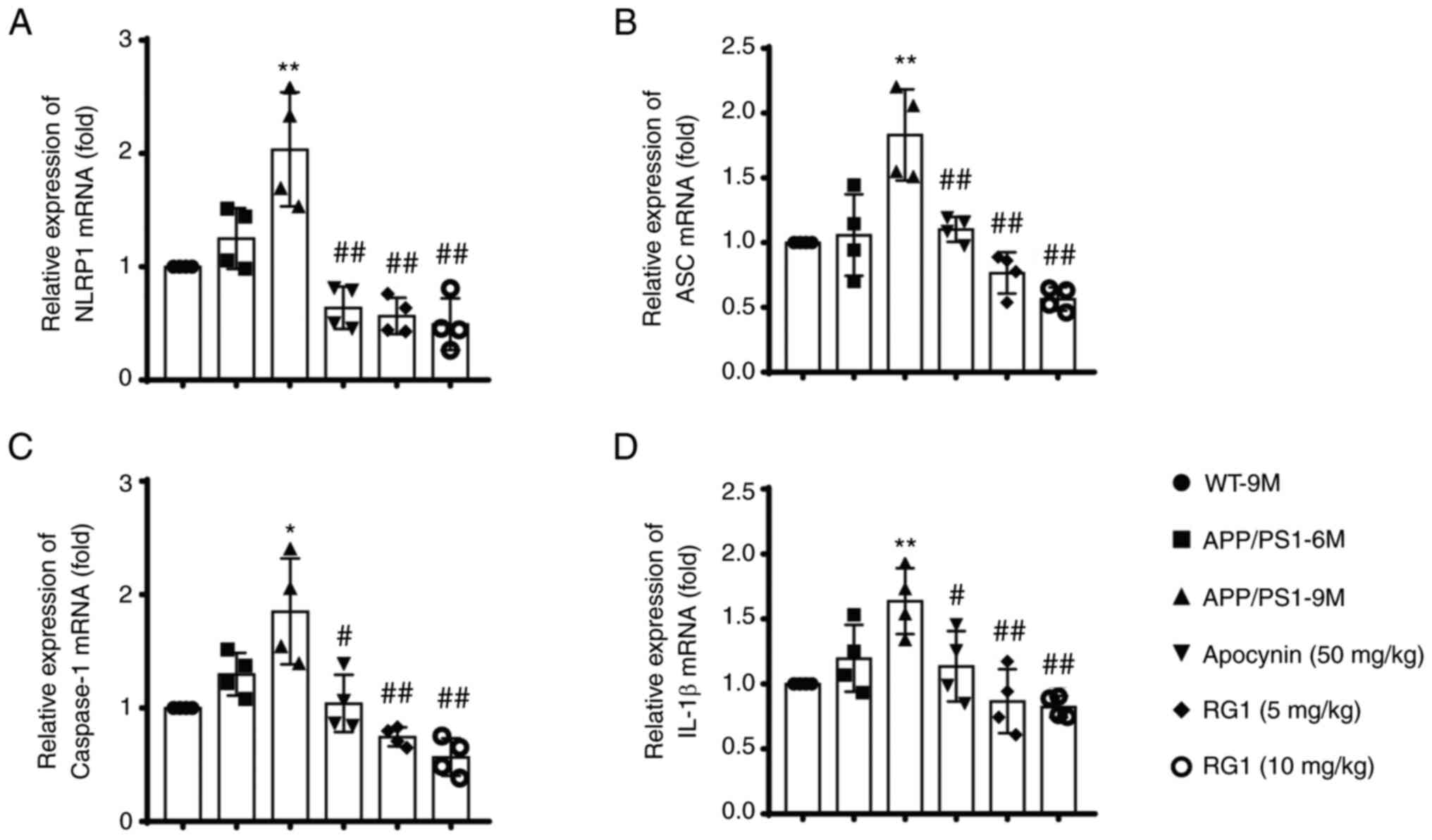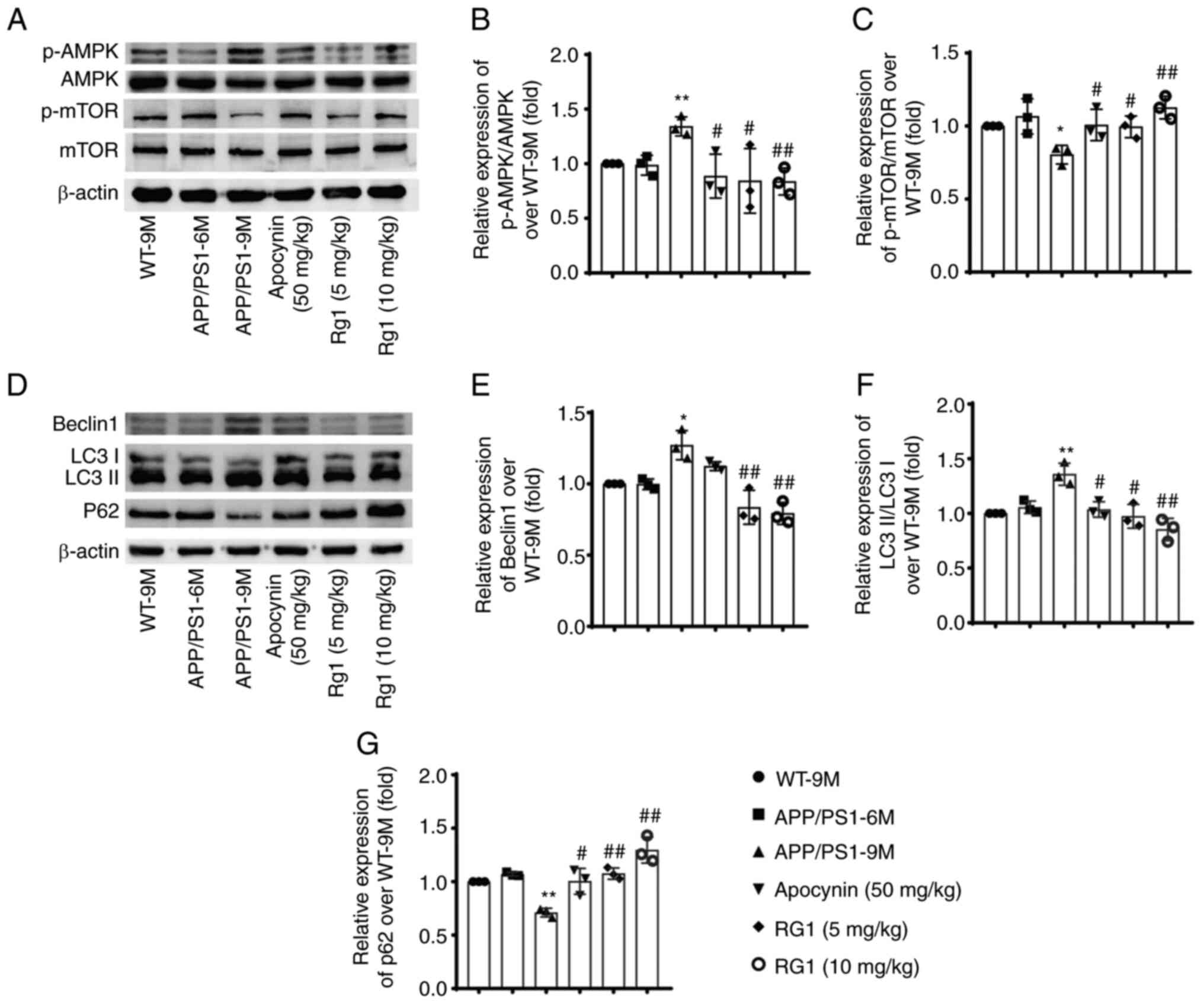|
1
|
Gouras GK, Olsson TT and Hansson O:
β-Amyloid peptides and amyloid plaques in Alzheimer's disease.
Neurotherapeutics. 12:3–11. 2015. View Article : Google Scholar : PubMed/NCBI
|
|
2
|
Zolezzi JM, Bastias-Candia S, Santos MJ
and Inestrosa NC: Alzheimer's disease: Relevant molecular and
physiopathological events affecting amyloid-β brain balance and the
putative role of PPARs. Front Aging Neurosci. 6:1762014. View Article : Google Scholar : PubMed/NCBI
|
|
3
|
Hardy J and Selkoe DJ: The amyloid
hypothesis of Alzheimer's disease: Progress and problems on the
road to therapeutics. Science. 297:353–356. 2002. View Article : Google Scholar : PubMed/NCBI
|
|
4
|
Kuang H, Tan CY, Tian HZ, Liu LH, Yang MW,
Hong FF and Yang SL: Exploring the bi-directional relationship
between autophagy and Alzheimer's disease. CNS Neurosci Ther.
26:155–166. 2020. View Article : Google Scholar : PubMed/NCBI
|
|
5
|
Newcombe EA, Camats-Perna J, Silva ML,
Valmas N, Huat TJ and Medeiros R: Inflammation: The link between
comorbidities, genetics, and Alzheimer's disease. J
Neuroinflammation. 15:2762018. View Article : Google Scholar : PubMed/NCBI
|
|
6
|
Parzych KR and Klionsky DJ: An overview of
autophagy: Morphology, mechanism, and regulation. Antioxid Redox
Signal. 20:460–473. 2014. View Article : Google Scholar : PubMed/NCBI
|
|
7
|
Kim KH and Lee MS: Autophagy-a key player
in cellular and body metabolism. Nat Rev Endocrinol. 10:322–337.
2014. View Article : Google Scholar : PubMed/NCBI
|
|
8
|
Saha S, Panigrahi DP, Patil S and Bhutia
SK: Autophagy in health and disease: A comprehensive review. Biomed
Pharmacother. 104:485–495. 2018. View Article : Google Scholar : PubMed/NCBI
|
|
9
|
Nixon RA: Autophagy, amyloidogenesis and
Alzheimer disease. J Cell Sci. 120:4081–4091. 2007. View Article : Google Scholar : PubMed/NCBI
|
|
10
|
Steele JW, Fan E, Kelahmetoglu Y, Tian Y
and Bustos V: Modulation of autophagy as a therapeutic target for
Alzheimer's disease. Postdoc J. 1:21–34. 2013.PubMed/NCBI
|
|
11
|
Nilsson P, Loganathan K, Sekiguchi M,
Matsuba Y, Hui K, Tsubuki S, Tanaka M, Iwata N, Saito T and Saido
TC: Aβ secretion and plaque formation depend on autophagy. Cell
Rep. 5:61–69. 2013. View Article : Google Scholar : PubMed/NCBI
|
|
12
|
Li Q, Liu Y and Sun M: Autophagy and
Alzheimer's disease. Cell Mol Neurobiol. 37:377–388. 2017.
View Article : Google Scholar : PubMed/NCBI
|
|
13
|
Forloni G and Balducci C: Alzheimer's
disease, oligomers, and inflammation. J Alzheimers Dis.
62:1261–1276. 2018. View Article : Google Scholar : PubMed/NCBI
|
|
14
|
Chavarria-Smith J and Vance RE: The NLRP1
inflammasomes. Immunol Rev. 265:22–34. 2015. View Article : Google Scholar : PubMed/NCBI
|
|
15
|
Yap JKY, Pickard BS, Chan EWL and Gan SY:
The role of neuronal NLRP1 inflammasome in Alzheimer's disease:
Bringing neurons into the neuroinflammation game. Mol Neurobiol.
56:7741–7753. 2019. View Article : Google Scholar : PubMed/NCBI
|
|
16
|
Zhang F and Jiang L: Neuroinflammation in
Alzheimer's disease. Neuropsychiatr Dis Treat. 11:243–256. 2015.
View Article : Google Scholar : PubMed/NCBI
|
|
17
|
Kaushal V, Dye R, Pakavathkumar P, Foveau
B, Flores J, Hyman B, Ghetti B, Koller BH and LeBlanc AC: Neuronal
NLRP1 inflammasome activation of caspase-1 coordinately regulates
inflammatory interleukin-1-beta production and axonal
degeneration-associated caspase-6 activation. Cell Death Differ.
22:1676–1686. 2015. View Article : Google Scholar : PubMed/NCBI
|
|
18
|
Tan MS, Tan L, Jiang T, Zhu XC, Wang HF,
Jia CD and Yu JT: Amyloid-β induces NLRP1-dependent neuronal
pyroptosis in models of Alzheimer's disease. Cell Death Dis.
5:e13822014. View Article : Google Scholar : PubMed/NCBI
|
|
19
|
Sun D, Gao G, Zhong B, Zhang H, Ding S,
Sun Z, Zhang Y and Li W: NLRP1 inflammasome involves in learning
and memory impairments and neuronal damages during aging process in
mice. Behav Brain Funct. 17:112021. View Article : Google Scholar : PubMed/NCBI
|
|
20
|
Chu SF, Zhang Z, Zhou X, He WB, Chen C,
Luo P, Liu DD, Ai QD, Gong HF, Wang ZZ, et al: Ginsenoside Rg1
protects against ischemic/reperfusion-induced neuronal injury
through miR-144/Nrf2/ARE pathway. Acta Pharmacol Sin. 40:13–25.
2019. View Article : Google Scholar : PubMed/NCBI
|
|
21
|
Zhang Z, Song Z, Shen F, Xie P, Wang J,
Zhu AS and Zhu G: Ginsenoside Rg1 prevents PTSD-like behaviors in
mice through promoting synaptic proteins, reducing Kir4.1 and TNF-α
in the hippocampus. Mol Neurobiol. 58:1550–1563. 2021. View Article : Google Scholar : PubMed/NCBI
|
|
22
|
Xu TZ, Shen XY, Sun LL, Chen YL, Zhang BQ,
Huang DK and Li WZ: Ginsenoside Rg1 protects against H2O2-induced
neuronal damage due to inhibition of the NLRP1 inflammasome
signalling pathway in hippocampal neurons in vitro. Int J Mol Med.
43:717–726. 2019.PubMed/NCBI
|
|
23
|
Zhang H, Su Y, Sun Z, Chen M, Han Y, Li Y,
Dong X, Ding S, Fang Z and Li W and Li W: Ginsenoside Rg1
alleviates Aβ deposition by inhibiting NADPH oxidase 2 activation
in APP/PS1 mice. J Ginseng Res. 45:665–675. 2021. View Article : Google Scholar : PubMed/NCBI
|
|
24
|
Xue Z, Zhang Z, Liu H, Li W, Guo X, Zhang
Z, Liu Y, Jia L, Li Y, Ren Y, et al: lincRNA-Cox2 regulates NLRP3
inflammasome and autophagy mediated neuroinflammation. Cell Death
Differ. 26:130–145. 2019. View Article : Google Scholar : PubMed/NCBI
|
|
25
|
Yang Y, Li J, Rao T, Fang Z and Zhang J:
The role and mechanism of hyperoside against myocardial infarction
in mice by regulating autophagy via NLRP1 inflammation pathway. J
Ethnopharmacol. 276:1141872021. View Article : Google Scholar : PubMed/NCBI
|
|
26
|
Han Y, Li X, Yang L, Zhang D, Li L, Dong
X, Li Y, Qun S and Li W: Ginsenoside Rg1 attenuates cerebral
ischemia-reperfusion injury due to inhibition of NOX2-mediated
calcium homeostasis dysregulation in mice. J Ginseng Res.
46:515–525. 2022. View Article : Google Scholar : PubMed/NCBI
|
|
27
|
Chen Y, Ding S, Zhang H, Sun Z, Shen X,
Sun L, Yin Y, Qun S and Li W: Protective effects of ginsenoside Rg1
on neuronal senescence due to inhibition of NOX2 and NLRP1
inflammasome activation in SAMP8 mice. J Funct Foods.
65:1037132020. View Article : Google Scholar
|
|
28
|
Yu Q, Guo P, Li D, Zuo L, Lian T, Yu S, Hu
Y, Liu L, Jin Z, Wang R, et al: Olfactory dysfunction and its
relationship with clinical symptoms of Alzheimer disease. Aging
Dis. 9:1084–1095. 2018. View Article : Google Scholar : PubMed/NCBI
|
|
29
|
Li W, Li S, Shen L, Wang J, Wu X, Li J, Tu
C, Ye X and Ling S: Impairment of dendrodendritic inhibition in the
olfactory bulb of APP/PS1 mice. Front Aging Neurosci. 11:22019.
View Article : Google Scholar : PubMed/NCBI
|
|
30
|
Liu Y, Zhang Y, Zheng X, Fang T, Yang X,
Luo X, Guo A, Newell KA, Huang XF and Yu Y: Galantamine improves
cognition, hippocampal inflammation, and synaptic plasticity
impairments induced by lipopolysaccharide in mice. J
Neuroinflammation. 15:1122018. View Article : Google Scholar : PubMed/NCBI
|
|
31
|
Hu YD, Pang W, He CC, Lu H, Liu W, Wang
ZY, Liu YQ, Huang CY and Jiang YG: The cognitive impairment induced
by zinc deficiency in rats aged 0~2 months related to BDNF DNA
methylation changes in the hippocampus. Nutr Neurosci. 20:519–525.
2017. View Article : Google Scholar : PubMed/NCBI
|
|
32
|
Zhang B, Zhang Y, Wu W, Xu T, Yin Y, Zhang
J, Huang D and Li W: Chronic glucocorticoid exposure activates
BK-NLRP1 signal involving in hippocampal neuron damage. J
Neuroinflammation. 14:1392017. View Article : Google Scholar : PubMed/NCBI
|
|
33
|
Livak KJ and Schmittgen TD: Analysis of
relative gene expression data using real-time quantitative PCR and
the 2(−Delta Delta C(T)) method. Methods. 25:402–408. 2001.
View Article : Google Scholar : PubMed/NCBI
|
|
34
|
Morton H, Kshirsagar S, Orlov E, Bunquin
LE, Sawant N, Boleng L, George M, Basu T, Ramasubramanian B,
Pradeepkiran JA, et al: Defective mitophagy and synaptic
degeneration in Alzheimer's disease: Focus on aging, mitochondria
and synapse. Free Radic Biol Med. 172:652–667. 2021. View Article : Google Scholar : PubMed/NCBI
|
|
35
|
Uddin MS, Stachowiak A, Mamun AA, Tzvetkov
NT, Takeda S, Atanasov AG, Bergantin LB, Abdel-Daim MM and
Stankiewicz AM: Autophagy and Alzheimer's disease: From molecular
mechanisms to therapeutic implications. Front Aging Neurosci.
10:042018. View Article : Google Scholar : PubMed/NCBI
|
|
36
|
Barage SH and Sonawane KD: Amyloid cascade
hypothesis: Pathogenesis and therapeutic strategies in Alzheimer's
disease. Neuropeptides. 52:1–18. 2015. View Article : Google Scholar : PubMed/NCBI
|
|
37
|
Tonnies E and Trushina E: Oxidative
stress, synaptic dysfunction, and Alzheimer's disease. J Alzheimers
Dis. 57:1105–1121. 2017. View Article : Google Scholar : PubMed/NCBI
|
|
38
|
Mei X, Feng H and Shao B: Alleviation of
sepsis-associated encephalopathy by ginsenoside via inhibition of
oxidative stress and cell apoptosis: An experimental study. Pak J
Pharm Sci. 33:2567–2577. 2020.PubMed/NCBI
|
|
39
|
Jin Y, Peng J, Wang X, Zhang D and Wang T:
Ameliorative effect of ginsenoside Rg1 on
lipopolysaccharide-induced cognitive impairment: Role of
cholinergic system. Neurochem Res. 42:1299–1307. 2017. View Article : Google Scholar : PubMed/NCBI
|
|
40
|
Dong X, Li L, Zhang D, Su Y, Yang L, Li X,
Han Y and Li W and Li W: Ginsenoside Rg1 attenuates LPS-induced
cognitive impairments and neuroinflammation by inhibiting NOX2 and
Ca2+-CN-NFAT1 signaling in mice. J Funct Foods.
87:1047912021. View Article : Google Scholar
|
|
41
|
Zhao J, He B, Zhang S, Huang W and Li X:
Ginsenoside Rg1 alleviates acute liver injury through the induction
of autophagy and suppressing NF-κB/NLRP3 inflammasome signaling
pathway. Int J Med Sci. 18:1382–1389. 2021. View Article : Google Scholar : PubMed/NCBI
|
|
42
|
Radde R, Bolmont T, Kaeser SA,
Coomaraswamy J, Lindau D, Stoltze L, Calhoun ME, Jäggi F, Wolburg
H, Gengler S, et al: Abeta42-driven cerebral amyloidosis in
transgenic mice reveals early and robust pathology. EMBO Rep.
7:940–946. 2006. View Article : Google Scholar : PubMed/NCBI
|
|
43
|
Li J, Yang JY, Yao XC, Xue X, Zhang QC,
Wang XX, Ding LL and Wu CF: Oligomeric Aβ-induced microglial
activation is possibly mediated by NADPH oxidase. Neurochem Res.
38:443–452. 2013. View Article : Google Scholar : PubMed/NCBI
|
|
44
|
Qiu LL, Luo D, Zhang H, Shi YS, Li YJ, Wu
D, Chen J, Ji MH and Yang JJ: Nox-2-mediated phenotype loss of
hippocampal parvalbumin interneurons might contribute to
postoperative cognitive decline in aging mice. Front Aging
Neurosci. 8:2342016. View Article : Google Scholar : PubMed/NCBI
|
|
45
|
Dos-Santos-Pereira M, Guimarães FS,
Del-Bel E, Raisman-Vozari R and Michel PP: Cannabidiol prevents
LPS-induced microglial inflammation by inhibiting
ROS/NF-κB-dependent signaling and glucose consumption. Glia.
68:561–573. 2020. View Article : Google Scholar : PubMed/NCBI
|
|
46
|
Ding Z, Liu S, Wang X, Khaidakov M, Dai Y
and Mehta JL: Oxidant stress in mitochondrial DNA damage, autophagy
and inflammation in atherosclerosis. Sci Rep. 3:10772013.
View Article : Google Scholar : PubMed/NCBI
|
|
47
|
Lu Q, Harris VA, Kumar S, Mansour HM and
Black SM: Autophagy in neonatal hypoxia ischemic brain is
associated with oxidative stress. Redox Biol. 6:516–523. 2015.
View Article : Google Scholar : PubMed/NCBI
|
|
48
|
Dan X, Wechter N, Gray S, Mohanty JG,
Croteau DL and Bohr VA: Olfactory dysfunction in aging and
neurodegenerative diseases. Ageing Res Rev. 70:1014162021.
View Article : Google Scholar : PubMed/NCBI
|
|
49
|
Harris JA, Devidze N, Verret L, Ho K,
Halabisky B, Thwin MT, Kim D, Hamto P, Lo I, Yu GQ, et al:
Transsynaptic progression of amyloid-β-induced neuronal dysfunction
within the entorhinal-hippocampal network. Neuron. 68:428–441.
2010. View Article : Google Scholar : PubMed/NCBI
|
|
50
|
Cui YQ, Wang Q, Zhang DM, Wang JY, Xiao B,
Zheng Y and Wang XM: Triptolide rescues spatial memory deficits and
amyloid-β aggregation accompanied by inhibition of inflammatory
responses and MAPKs activity in APP/PS1 transgenic mice. Curr
Alzheimer Res. 13:288–296. 2016. View Article : Google Scholar : PubMed/NCBI
|
|
51
|
Minter MR, Taylor JM and Crack PJ: The
contribution of neuroinflammation to amyloid toxicity in
Alzheimer's disease. J Neurochem. 136:457–474. 2016. View Article : Google Scholar : PubMed/NCBI
|
|
52
|
Rubio-Perez JM and Morillas-Ruiz JM: A
review: Inflammatory process in Alzheimer's disease, role of
cytokines. ScientificWorldJournal. 2012:7563572012. View Article : Google Scholar : PubMed/NCBI
|
|
53
|
Alam Q, Alam MZ, Mushtaq G, Damanhouri GA,
Rasool M, Kamal MA and Haque A: Inflammatory Process in Alzheimer's
and Parkinson's diseases: Central role of cytokines. Curr Pharm
Des. 22:541–548. 2016. View Article : Google Scholar : PubMed/NCBI
|
|
54
|
Torres-Acosta N, O'Keefe JH, O'Keefe EL,
Isaacson R and Small G: Therapeutic potential of TNF-α inhibition
for Alzheimer's disease prevention. J Alzheimers Dis. 78:619–626.
2020. View Article : Google Scholar : PubMed/NCBI
|
|
55
|
Pickering M and O'Connor JJ:
Pro-inflammatory cytokines and their effects in the dentate gyrus.
Progress in Brain Research. Scharfman HE: Elsevier; pp. 339–354.
2007, View Article : Google Scholar : PubMed/NCBI
|
|
56
|
Jiang Y, Li K, Li X, Xu L and Yang Z:
Sodium butyrate ameliorates the impairment of synaptic plasticity
by inhibiting the neuroinflammation in 5XFAD mice. Chem Biol
Interact. 341:1094522021. View Article : Google Scholar : PubMed/NCBI
|
|
57
|
Liao YF, Wang BJ, Cheng HT, Kuo LH and
Wolfe MS: Tumor necrosis factor-alpha, interleukin-1beta, and
interferon-gamma stimulate gamma-secretase-mediated cleavage of
amyloid precursor protein through a JNK-dependent MAPK pathway. J
Biol Chem. 279:49523–49532. 2004. View Article : Google Scholar : PubMed/NCBI
|
|
58
|
Zhang Y, Ding S, Chen Y, Sun Z, Zhang J,
Han Y, Dong X, Fang Z and Li W: Ginsenoside Rg1 alleviates
lipopolysaccharide-induced neuronal damage by inhibiting NLRP1
inflammasomes in HT22 cells. Exp Ther Med. 22:7822021. View Article : Google Scholar : PubMed/NCBI
|
|
59
|
Fan JJ, Gao B, Song AQ, Zhu YJ, Zhou J, Li
WZ, Yin YY and Wu WN: Spinal cord NLRP1 inflammasome contributes to
dry skin induced chronic itch in mice. J Neuroinflammation.
17:1222020. View Article : Google Scholar : PubMed/NCBI
|
|
60
|
Doherty J and Baehrecke EH: Life, death
and autophagy. Nat Cell Biol. 20:1110–1117. 2018. View Article : Google Scholar : PubMed/NCBI
|
|
61
|
Lee KM, Hwang SK and Lee JA: Neuronal
autophagy and neurodevelopmental disorders. Exp Neurobiol.
22:133–142. 2013. View Article : Google Scholar : PubMed/NCBI
|
|
62
|
Watanabe Y, Taguchi K and Tanaka M:
Ubiquitin, autophagy and neurodegenerative diseases. Cells.
9:20222020. View Article : Google Scholar : PubMed/NCBI
|
|
63
|
Reddy PH and Oliver DM: Amyloid beta and
phosphorylated tau-induced defective autophagy and mitophagy in
Alzheimer's disease. Cells. 8:4882019. View Article : Google Scholar : PubMed/NCBI
|
|
64
|
Lu J, Wu M and Yue Z: Autophagy and
Parkinson's disease. Adv Exp Med Biol. 1207:21–51. 2020. View Article : Google Scholar : PubMed/NCBI
|
|
65
|
Croce KR and Yamamoto A: A role for
autophagy in Huntington's disease. Neurobiol Dis. 122:16–22. 2019.
View Article : Google Scholar : PubMed/NCBI
|
|
66
|
Marino G, Madeo F and Kroemer G: Autophagy
for tissue homeostasis and neuroprotection. Curr Opin Cell Biol.
23:198–206. 2011. View Article : Google Scholar : PubMed/NCBI
|
|
67
|
Zhou F, van Laar T, Huang H and Zhang L:
APP and APLP1 are degraded through autophagy in response to
proteasome inhibition in neuronal cells. Protein Cell. 2:377–383.
2011. View Article : Google Scholar : PubMed/NCBI
|
|
68
|
Son SM, Jung ES, Shin HJ, Byun J and
Mook-Jung I: Aβ-induced formation of autophagosomes is mediated by
RAGE-CaMKKβ-AMPK signaling. Neurobiol Aging. 33:1006.e11–e23. 2012.
View Article : Google Scholar : PubMed/NCBI
|
|
69
|
Spilman P, Podlutskaya N, Hart MJ, Debnath
J, Gorostiza O, Bredesen D, Richardson A, Strong R and Galvan V:
Inhibition of mTOR by rapamycin abolishes cognitive deficits and
reduces amyloid-beta levels in a mouse model of Alzheimer's
disease. PLoS One. 5:e99792010. View Article : Google Scholar : PubMed/NCBI
|
|
70
|
Li ZY, Chen LH, Zhao XY, Chen H, Sun YY,
Lu MH, Wang ZT, Chen M, Lu L, Huang W, et al: Clemastine attenuates
AD-like pathology in an AD model mouse via enhancing mTOR-mediated
autophagy. Exp Neurol. 342:1137422021. View Article : Google Scholar : PubMed/NCBI
|
|
71
|
Chu CT: Autophagic stress in neuronal
injury and disease. J Neuropathol Exp Neurol. 65:423–432. 2006.
View Article : Google Scholar : PubMed/NCBI
|
|
72
|
Nixon RA, Wegiel J, Kumar A, Yu WH,
Peterhoff C, Cataldo A and Cuervo AM: Extensive involvement of
autophagy in Alzheimer disease: An immuno-electron microscopy
study. J Neuropathol Exp Neurol. 64:113–122. 2005. View Article : Google Scholar : PubMed/NCBI
|
|
73
|
Wang C, Zhang X, Teng Z, Zhang T and Li Y:
Downregulation of PI3K/Akt/mTOR signaling pathway in
curcumin-induced autophagy in APP/PS1 double transgenic mice. Eur J
Pharmacol. 740:312–320. 2014. View Article : Google Scholar : PubMed/NCBI
|
|
74
|
Kabeya Y, Mizushima N, Ueno T, Yamamoto A,
Kirisako T, Noda T, Kominami E, Ohsumi Y and Yoshimori T: LC3, a
mammalian homologue of yeast Apg8p, is localized in autophagosome
membranes after processing. EMBO J. 19:5720–5728. 2000. View Article : Google Scholar : PubMed/NCBI
|
|
75
|
Wang R and Hu W: Asprosin promotes β-cell
apoptosis by inhibiting the autophagy of β-cell via AMPK-mTOR
pathway. J Cell Physiol. 236:215–221. 2021. View Article : Google Scholar : PubMed/NCBI
|
|
76
|
Mizushima N: A(beta) generation in
autophagic vacuoles. J Cell Biol. 171:15–17. 2005. View Article : Google Scholar : PubMed/NCBI
|
|
77
|
Lenoir O, Tharaux PL and Huber TB:
Autophagy in kidney disease and aging: Lessons from rodent models.
Kidney Int. 90:950–964. 2016. View Article : Google Scholar : PubMed/NCBI
|
|
78
|
François A, Terro F, Janet T, Rioux Bilan
A, Paccalin M and Page G: Involvement of interleukin-1β in the
autophagic process of microglia: Relevance to Alzheimer's disease.
J Neuroinflammation. 10:1512013. View Article : Google Scholar : PubMed/NCBI
|
|
79
|
François A, Rioux Bilan A, Quellard N,
Fernandez B, Janet T, Chassaing D, Paccalin M, Terro F and Page G:
Longitudinal follow-up of autophagy and inflammation in brain of
APPswePS1dE9 transgenic mice. J Neuroinflammation. 11:1392014.
View Article : Google Scholar : PubMed/NCBI
|















